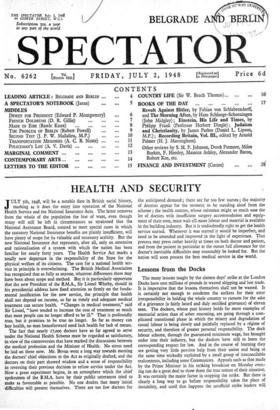HEALTH AND SECURITY
JULY 5th, 1948, will be a notable date in British social history, marking as it does the entry into operation of the National Health Service and the National Insurance Acts. The latter removes from the whole of the population the fear of want, even though many will still be left in circumstances so straitened that the National Assistance Board, created to meet special cases in which the statutory National Insurance benefits are plainly insufficient, will have plenty of scope for its valuable and necessary activity. But the new National Insurance Act represents, after all, only an extension and rationalisation of a system with which the nation has been familiar for nearly forty years. The Health Service Act marks a totally new departure in the responsibility of the State for the physical welfare of its citizens. The case for a national health ser- vice in principle is overwhelming. The British Medical Association has recognised that as fully as anyone, whatever differences there may have been about scope and method. But it is particularly opportune that the new President of the B.MA., Sir Lionel Whitby, should in his presidential address have fixed attention so firmly on the funda- mental justification for the new service, the principle that health shall not depend on income, so far as timely and adequate medical treatment can secure health. " Changes in medical treatment," said Sir Lionel, " have tended to increase the cost of treatment so much that most people can no longer afford to be ill." That is profoundly true, but it promises to be true no longer. So far as money can buy health, no man henceforward need lack health for lack of means.
The fact that nearly 17,000 doctors have so far agreed to serve under the National Health Scheme must be regarded as satisfactory, in view of the controversies that have marked the discussions between the medical profession and the Minister of Health. No stress need be laid on these now. Mr. Bevan went a long way towards meeting the doctors' chief objections to the Act as originally drafted, and the doctors on their part showed wisdom and a sense of responsibility in reversing their previous decision to refuse service under the Act. Now a great experiment begins, in an atmosphere which the chief spokesmen of the B.M.A. have by their public utterances tried to make as favourable as possible. No one doubts that many. initial difficulties will present themselves. There are too few doctors for the anticipated demand ; there are far too few nurses ; the majority of dentists appear for the moment to be standing aloof from the scheme ; the health centres, whose existence might so much ease the lot of doctors with insufficient surgery accommodation and equip- ment of their own, must wait till more labour and material is available in the building industry. But it is undoubtedly right to get the health service started. Whenever it was started it would be imperfect, and need to be amended and improved in the light of experience. That process may press rather heavily at times on both doctor and patient, and from the patient in particular at the outset full allowance for the doctor's inevitable difficulties may reasonably be looked for. But the nation will soon possess the best medical service in the world_






































 Previous page
Previous page